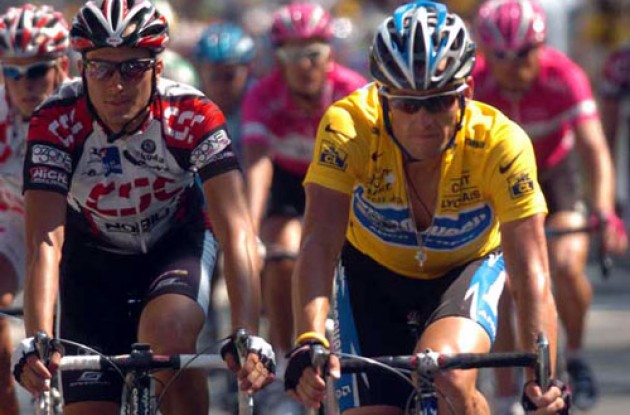Perfect time trial means building entire day around one hour
Imagine building your entire day around one hour. One hour in which only a perfect performance will be considered successful.
The final test in Lance Armstrong's quest to win a seventh Tour de France comes in Saturday's Stage 20 individual time trial, and after 14 years as a professional cyclist, it comes down to one perfect hour.
An individual time trial can be the loneliest hour of a cyclist's life. While most cycling events involve a pack of riders, you're all by yourself during the individual time trial. There are no teammates to call on for help and no one to draft behind. There's a car following you, but the people in it can't give you food or water. It's just you against the clock, fastest man wins.
Lance Armstrong excels in this discipline. To be successful in what's referred to as ``the race of truth,'' you have to have the ability to produce a massive amount of power and hold that intensity for 60-80 minutes. To win Saturday, Lance will have to average about 30-31 mph for about 72-74 minutes. To put that in perspective, the average cyclist can sustain 30-31 mph for about three minutes.
In order to win an individual time trial in the Tour de France, Lance seeks perfection. It's not enough to be perfect on the bike; everything he does from the moment he wakes up has an impact on his performance.
The day starts at about
After breakfast, Lance and his teammates will go out on the road for a short spin. Lance will ride his time trial bike for about 25-30 miles to get comfortable on the bike and stretch his legs. He hasn't been on this very specific machine for more than two weeks, and it's good to get reacquainted with it in the morning before competing in the afternoon.
Once he gets back from his morning ride at about
Lance will eat his last substantial meal about two and a half hours before his start time. As the race leader, Lance will be the last rider to roll out of the start house, so his start time will be late, probably around
There is a rule in cycling that the shorter an event, the longer the warmup. For long road stages, riders barely warm up at all. Lance warms up for about 50 minutes before long individual time trials, and he'll arrive at the race site about 90 minutes before his start time to get ready and start warming up.
While Lance changes clothes in the team bus, his time trial bike will be put on a stationary trainer outside. Some of his teammates will be there warming up for their own time trials, and the others will already be on the course. Lance's 50-minute warmup is not just a simple spin to loosen up. To win a time trial, you have to be ready to ride at maximum speed from the moment you leave the start house. You have to prepare your body, otherwise the shock of going from rest to maximum effort will significantly harm your performance.
Lance's warmup is designed to wake a sleeping giant. He has to gradually activate his aerobic engine, and then increase intensity to progressively activate the energy systems that power successively harder efforts. Lance goes hard in his warmup, and actually goes above the effort level he reaches during competition. He needs to kick-start the mechanisms that control the production of energy and metabolic byproducts when exercising at very high intensities.
About 10 minutes before his start time, Lance wraps up his warmup, eats a PowerGel and tucks another under the leg of his skinsuit. His bike is removed from the stationary trainer, checked over by the mechanic, and Lance heads for the start house.
Once Lance looks down the ramp to the road ahead, all of the hours since he woke up melt away. He sits still on his bike, both feet secured onto his pedals while someone holds him upright by the back of his seat. The starter finally begins the countdown. His fingers count down the final five seconds to Lance's start time, and then his hand flattens and extends out over the ramp. It's time to go.
For the next hour and change, Lance will ride as hard and fast as his body and physics will allow. Though he'll burn more than 1500 calories during the effort and sweat out about two liters of fluid, he'll only consume one 100-calorie PowerGel and one 500-millileter bottle of fluid. There's no time for more food and nowhere to carry more fluid.
Moreover, there's no room for error. There can be no stiff back from a poor night's sleep, nor an empty or upset stomach from a bad or incorrectly-scheduled meal, or mechanical problems with the bike or insufficient power from an inadequate warmup. Perfect rides come from perfect preparation, and there's no one who has mastered the art and science of preparation the way Lance Armstrong has.
Our Tour de France coverage is presented by our Tour coverage sponsors Headsweats, ZIPP, and Veloemail.com. Please support them today!








